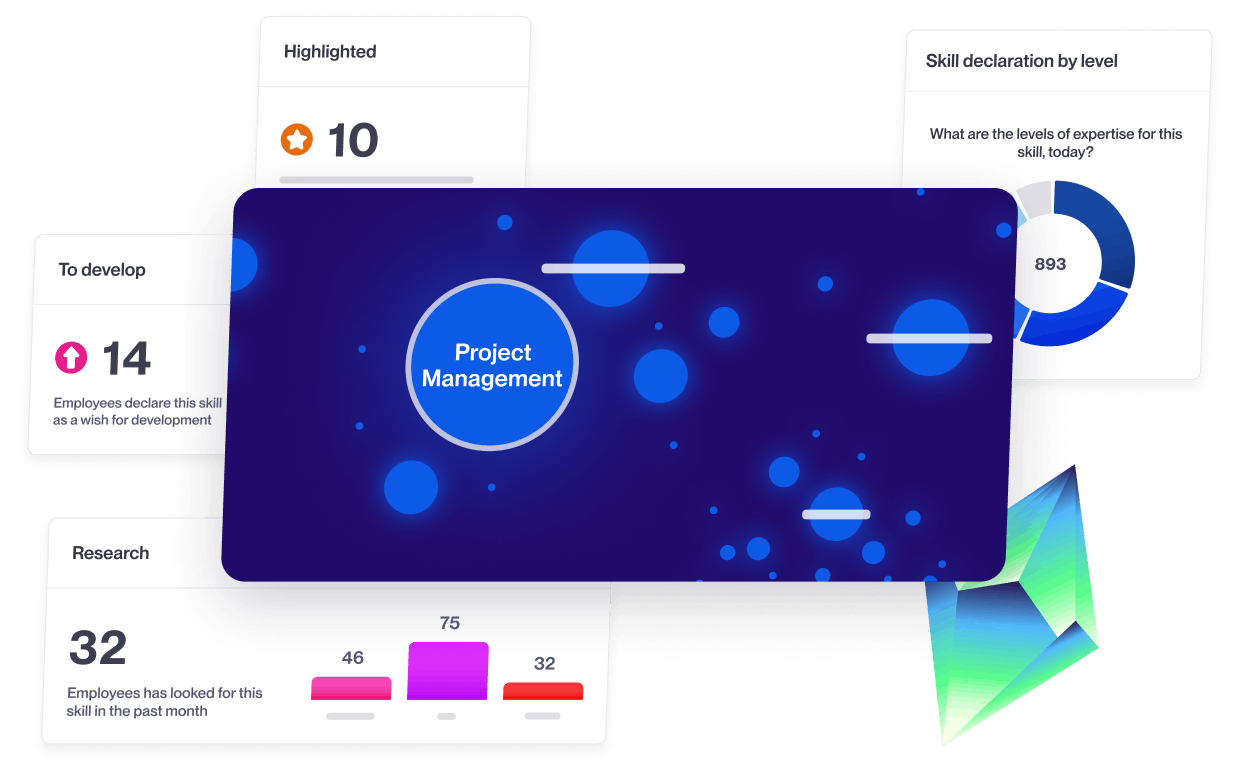Future of HR: 10 HR trends and predictions for 2025

Are you ready for 2025?
If the past three years have taught HR teams anything, it’s to expect the unexpected. From navigating seismic shifts in workforce dynamics to staying agile amidst economic uncertainty, HR has been at the heart of organizational resilience.
As the calendar turns, HR professionals face a dual challenge: closing out the year with strategic priorities like budgeting, planning, and leave management while gearing up for what’s next. Amidst the whirlwind of holiday preparations and mounting workloads, it’s natural to feel unprepared for the future.
But here’s the good news: we’ve done the heavy lifting for you. By identifying the global trends set to define HR in 2025, you can move from reactive to proactive—equipped with insights that empower your organization to lead the way.
These predictions aren’t just about staying ahead; they’re about transforming how you manage talent, support employees, and drive business success. Their early adoption will not only sharpen your competitive edge but also enhance employee well-being and performance across the board.
Ready to future-proof your HR strategy? Dive in as we explore the top 10 trends that will shape the world of work in 2025.
Overview of the 2024 HR trends: what happened?
Last year, we wrote an article about what would unfold in 2024 in the HR world. The end of the year has come, and now we can look back on the trends, challenges, and shifts that truly shaped the industry.
What happened to skills-based hiring and workforce development?
Skills-based hiring has gained traction, with many organizations prioritizing skills over traditional credentials. Tools like AI-powered talent platforms now enable more precise skills matching. But the shift to skills-first hiring is uneven, particularly in industries with rigid qualification norms. Upskilling existing employees remains underfunded in some sectors.
What happened to Skills-Based Organizations (SBO)?
Many companies are transitioning to skills-based models, driven by AI tools for skill assessments and personalized training.While some organizations lead in this shift, others struggle with implementation due to legacy systems or cultural inertia. Fully embedding skills-based frameworks across all HR functions is still a work in progress. One thing we know for sure: skills-driven strategies still remain and will grow stronger in HR’s objectives next year.
What happened to managers’ role in talent development?
Managerial involvement in career development has increased, with many companies emphasizing collaborative performance reviews and individualized growth plans. But, in fact, adoption varies. Some managers lack the training or resources to execute effective career development strategies.
What happened to evolving career management?
Agile career paths and internal mobility programs have become more prevalent. Companies are creating tailored progression plans that align employee aspirations with business needs, but several employees still report unclear career trajectories, underscoring a need for better communication and transparent opportunities.
What happened to employee experience and retention solving quiet quitting?
Organizations have invested in employee experience initiatives to combat disengagement and "quiet quitting." Efforts include improving communication, recognition programs, and flexible working arrangements.
What happened to HR as experience designers?
The role of HR has expanded into "experience design", employing principles like design thinking to improve employee engagement and retention. But unfortunately, some HR teams lack the resources or technological support to fully transform into strategic experience designers. This challenge will continue in 2025 with hyper-personalization to talent experience and development.
What happened to AI and Data-Driven HR?
AI adoption in HR has accelerated, particularly in recruitment, workforce planning, and decision-making thanks to Generative AI tools assisting with administrative tasks and strategy formulation. HR professionals still lack a bit of readiness, but they are now considering ethics in AI as key to furthering their digital transformation.
What happened to AI driving workforce evolution?
AI has begun to transform work processes, with automation reducing routine tasks and enhancing employee productivity. The "AI-human collaboration" model is becoming more common and although concerns about job displacement and skill gaps for AI adoption persist, 2025 will be a pivot to bridge those gaps.
What happened to the relevance of Diversity, Equity, and Inclusion (DEI)?
DEI has continued to evolve, with organizations emphasizing not just recruitment but also retention and inclusive culture-building. But progress is uneven, with many companies still treating DEI as a compliance requirement rather than a strategic priority.
What happened to work-life balance and well-being?
Flexible working arrangements and well-being programs have become standard offerings, addressing the heightened focus on mental and physical health. But rising economic pressures and burnout among HR professionals themselves are complicating efforts to sustain a healthy work-life balance for all.
The trends we outlined in our 2024 article are largely materializing, though the pace and depth of adoption vary across industries and regions. Critical areas like skills-based frameworks, AI integration, and DEI are advancing but face structural and cultural challenges. Organizations that successfully adapt leverage technology, foster inclusivity, and emphasize employee-centric strategies to future-proof their workforce. For HR professionals, staying agile and strategically aligned with these trends will be key to navigating changes happening in 2025.








2025 HR trends predictions: what does the future hold for HR teams?

As 2024 closes, the human resources landscape continues to evolve. From advancing skills-based strategies to redefining employee experiences, HR leaders must prepare for another year of innovation and adaptation. Here’s a deep dive into the key trends shaping the future of HR in 2025.
Skills-based organizations are turning into skills-ready organizations
The focus on skills-first strategies remains strong, but the narrative is shifting. Organizations are evolving from simply identifying skills to being skills-ready. This means adopting agile talent ecosystems capable of responding to rapidly changing demands.
In 2025, HR teams will leverage AI-driven tools to dynamically map workforce skills, predict future needs, and enable faster reskilling. Skills-readiness is no longer about compiling static skills inventories—it’s about fostering a culture where skills continuously evolve alongside business needs.
Skills-readiness is about learning the mindsets, perspectives, and understanding that underpin skills thinking—and bringing those concepts into your work.
Josh Bersin Academy
,Hyper-personalization will fuel the whole employee experience
Employee experience in 2025 will move beyond standardized perks and benefits.
In the evolving landscape of work, hyper-personalization is reshaping how organizations connect with their people. By customizing experiences, growth opportunities, and career paths to reflect each individual’s unique skills and aspirations, companies can inspire greater engagement, innovation, and resilience. For HR, adopting this approach is a game-changer: it enables a more adaptive and human-centered workforce, where talent feels recognized and empowered to contribute meaningfully.
Hyper-personalization, powered by advanced AI and analytics, will tailor everything from career development paths to wellness programs based on individual preferences and needs.
In 2025, HR teams will craft experiences that recognize employees as unique contributors, improving engagement, productivity, and loyalty. Personalized learning journeys, customized leadership tracks, and even tailored communication styles will become essential pillars of talent management.
HR will take a step further in strategic workforce planning
Strategic workforce planning has often been constrained to short-term or reactionary measures. In 2025, this changes. HR teams will adopt forward-looking strategies that incorporate real-time data, predictive analytics, and scenario modeling.
By moving beyond headcount planning, HR will align talent strategies with business goals. Expect to see cross-functional collaboration between HR, finance, and operations to ensure workforce planning is not just strategic but anticipates market disruptions and business transformations.
Leaders and managers’ development to bridge training gaps faced in 2024
Many organizations faced significant leadership development gaps in 2024, leaving teams under-supported during times of change. In 2025, leadership and manager development programs will become more targeted, focusing on practical skills such as adaptive leadership, emotional intelligence, and inclusive management.
HR will prioritize continuous development for leaders, ensuring they can navigate complexities, inspire teams, and drive performance. Tailored coaching, immersive learning experiences, and measurable leadership metrics will dominate this space.
Pay transparency will be a huge topic that HR needs to tackle now
The demand for pay transparency is accelerating, driven by regulatory changes and employee expectations. By 2025, organizations that haven’t addressed this issue risk losing talent and reputation.
HR teams must proactively build transparent compensation frameworks, using clear communication to align pay structures with skills, roles, and performance. Technology will play a critical role in ensuring fairness, providing insights into pay equity, and mitigating unconscious bias.
People analytics approach will drive business outcomes
HR’s use of people analytics will reach new heights in 2025, transforming how businesses make decisions. People Analytics refers to HR's data-driven approach to understand and optimize various aspects of the workforce, including employee experience (EX). By leveraging data, HR can gain insights into employee behaviors, trends, and outcomes, ultimately driving more informed decision-making. With advanced tools, HR teams will shift from analyzing past trends to predicting future outcomes, enabling proactive strategies for retention, engagement, and performance.
This approach will integrate workforce data with business metrics, directly linking talent management efforts to organizational success. Whether forecasting turnover or assessing the ROI of development programs, people analytics will be a cornerstone of strategic decision-making.
Retention will be superior to hiring
The talent market remains competitive, but 2025 will mark a paradigm shift in priorities: retention over hiring. With skills gaps widening and recruitment costs climbing, retaining top talent will be the ultimate competitive advantage.
HR teams will focus on fostering engagement, aligning career growth opportunities with individual aspirations, and leveraging insights to predict and address attrition risks. Companies that build robust internal mobility programs and invest in reskilling will stay ahead of the curve.
Conclusion: Adaptation is key for HR teams in 2025
The year 2025 promises to be transformative for HR professionals. From evolving into skills-ready organizations to embracing hyper-personalized employee experiences, the trends ahead demand agility, innovation, and foresight. By proactively addressing these shifts, HR teams can position their organizations for success in an increasingly dynamic world.
Are you ready for 2025? The time to act is now.

With tools like 365Talents, HR teams gain a nuanced understanding of their employees’ capabilities, helping them align people with opportunities that drive both personal and organizational success. By embracing hyper-personalization, HR not only navigates the future of work but helps shape a workplace where every person’s potential is realized.








More articles on HR trends












